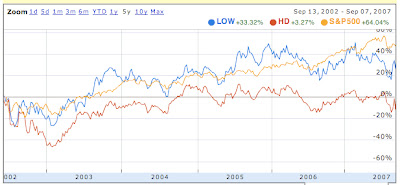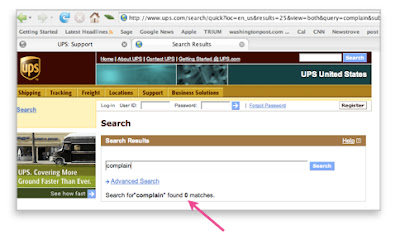Anyone tracking my comments (here and in public) on the Whole Foods acquisition controversy know that I believe the following:
1. Whole Foods is a grocery store, and small one compared to Safeway, Kroger, Albertson's or even Wal-Mart.
2. Even with Wild Oats as part of Whole Foods, the organic supermarket is small -- er, um -- potatoes.
3. The notion that the acquisition is anti-competitive is ludicrous.
4. On the other hand, the fact that people THINK it might be anticompetitive is proof that Whole Foods blue-ocean differentiation model was successful. They've created a new "category" of supermarket by exploiting and increasing demand for a new way of looking at food and groceries.
At what point, pundits should ask, is a "niche" actually a new sector? I would argue that this happens only when the niche has so redefined the sector that customers of that niche would never view companies outside that niche as viable choices.
Do you think that Safeway, Kroger, Albertson's and so on want to be viewed as an alternative to Whole Foods? You bet. David Scheffman, who provided expert testimony said that Whole Food customers will also buy organic products from other grocery stores, "which are increasingly offering such alternatives," although, in my opinion, not yet substantially enough. (See here for a nice short article on the legal and market details of this story.)
The issue raised that the judge should review pricing information from markets where Whole Foods and Wild Oats compete I believe is ultimately a moot one. The market principal would appear to be that, absent any local competition in organic groceries, one of these two companies would raise prices, indicating that more competition is better for the consumer. Well, this is true, but if that's so, then every "region" dominated by a certain retailer is a market that is unfair to consumers (where "region" is fuzzy, defined perhaps by the radius of the market's willingness to travel for products). As a practical matter, this impossible to enforce through regulation. In fact, one of the functions of a marketing analytics consultant to is determine the effectiveness of pricing strategies for national and international chains based on the proximity of competitors.
In short, consumers do indeed have choices. We shouldn't punish Whole Foods or Wild Oats for choosing a niche that has gained meaningful traction with consumers, thereby building their resistance to the less thoughtfully prepared/distributed products at the major chains.
This is not just a US phenomenon. There has been interesting analysis recently (see the Economist) on Wal-Mart's struggles in the UK point to a similar trend, I should point out. Tesco, a legendary grocery chain in the UK, is selling more organic products. This skews well to older, less price-sensitive consumers, and to younger, more health-conscious consumers. Wal-Mart's UK presence is represented by ASDA, which has until recently been pushing its every day, low price strategy.
But it's not been working for them. Some say that ASDA will eventually try to compete by offering organic products, but the key issue is the ASDA brand positioning. They will have to run away from "every day, low prices" as the real estate they own in the UK brain. They will have to become a different kind of grocery retailer. And the question is, does the Wal-Mart operational advantage really work for this kind of market positioning? Isn't organic all about local produce, higher costs of sourcing, smaller purchase lots, and so on? Wal-Mart is not geared for that.
Plus, Wal-Mart isn't culturally focused on a localizable customer experience. My fellow blogger Arun Kottolli said last year, "ASDA competes in grocery segment and in this segment ASDA has got it wrong. ASDA stores are modeled after a big store format. I visited ASDA today at Burnt Oak and the greens were a bit old & withered. The fresh ready-to-eat sandwiches were placed far away from the cash counter - making it unattractive for a casual customer. The merchandize [sic] is no way near the range & quality that as in the US."
Note that the merchandising is counter to creating a positive, branded customer experience. First, ASDA should want people to instantly associate it with gorgeous, local and organically grown produce. Whole Foods' first 10 seconds is dramatically better than ASDA's. Second, it is a common strategy for retailers (IKEA, for example) to force consumers to take the longest reasonable (or unreasonable) path around the store to maximize their purchase on that visit. ASDA may have put its prepared sandwiches far from the register on purpose.
What message does that send?
Of course, it may well be that ASDA doesn't care to improve that particular component of its customer experience. After all, you cannot and should not maximize customer pleasure at every point. (You can't afford to, and if you did you would be, interestingly, much less memorable for the experience points you want to own.) So let's grant that they are not looking to be remembered as a "convenient" place to shop.
Then, what will they stand for? ASDA (and therefore Wal-Mart) will be one to watch in the next twelve months.
 Friday, September 7, 2007 at 5:14PM
Friday, September 7, 2007 at 5:14PM 





